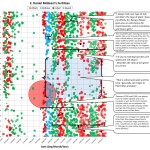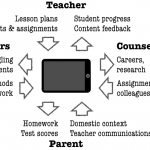What better way to ring in the New Year than to put your feet up and enjoy a few re-runs? Here are some of our most popular posts from the last year or so as well as a few you might have missed…
1. Posthumanity and digital superpowers

We’ve been blogging about Human 2.0 for over two years now, but it was this April that we split off from Bitcurrent and launched this site. We kicked off with two launch posts… a high-level scene-setter called Welcome to posthumanity:
“We’re becoming a new species–one that can hack its own cognition and edit its own biology. We’re all getting an upgrade, like it or not. This is the most important subject of the century, but it’s still hiding in academia and science fiction. We hope to change that.”

…and a look at some of the tangible ways in which the Internet gives us superpowers:
We may not realize it, but the Internet has given us superhuman abilities. Technology lets us to do things that were impossible 30 years ago – from speaking foreign languages and armchair travel to global messaging and virtual worlds. Welcome, Human 2.0, these are your superpowers.
2. It’s all about the data
Now that we live a significant part of our lives online, we generate data that can be used to create visualizations and learn more about people, for good or for ill. We may reveal details about ourselves that we’d rather keep private. This year we’ve explored this issue from several angles:
 Behavioural Analysis and the Age of Metrics explored how HCI researchers are using gameplay data to understand player behaviour and design better games, and examined the wider trend of analyzing human behaviour:
Behavioural Analysis and the Age of Metrics explored how HCI researchers are using gameplay data to understand player behaviour and design better games, and examined the wider trend of analyzing human behaviour:
As we enter the age of metrics, analyzing player behaviour in games and sports is just the tip of the iceberg. Already you can track your computer usage, the language you use, and even your sex life! In the future, visualizations of our life data will empower us to make better decisions.
 You can also learn a lot by analysing people’s social networks. Here’s what Twitter infers from your followers:
You can also learn a lot by analysing people’s social networks. Here’s what Twitter infers from your followers:
Analysis of social graphs will be part of an arms race similar to that seen in Search Engine Optimization, where unscrupulous marketers try to convince Google to list them in search results.
 We covered Ben Shneiderman’s talk on the importance of Human Network Analysis as a skill for the 21st century:
We covered Ben Shneiderman’s talk on the importance of Human Network Analysis as a skill for the 21st century:
Free network analysis tools are now being used by researchers to deliver valuable understanding and insights to practitioners in a variety of fields, from analysing Senate voting habits to healthcare and counter-terrorism research.
 What do your words say about you examined how each of us is now empowered to do our own analysis of authors and public speakers using tag clouds:
What do your words say about you examined how each of us is now empowered to do our own analysis of authors and public speakers using tag clouds:
We all produce more words digitally than ever before. With free tag cloud generators, anyone can analyze your language and learn a great deal about you in just a few seconds. The age of digital linguistics has begun.
 In our first foray into the realms of flash fiction, we explored the impact of music sharing on witness protection in “I know what you liked last summer”:
In our first foray into the realms of flash fiction, we explored the impact of music sharing on witness protection in “I know what you liked last summer”:
“Listen, we’ve had six other killings this week. Same M.O. They were all women in their mid-thirties. They were all killed, execution-style, late at night, just as Janet was. And most importantly, all six of them liked the same music.”
 In fact, computers might be used to uncover all sorts of patterns in people’s behaviour, some of which they might rather keep private. Periodicity tackled this delicate subject:
In fact, computers might be used to uncover all sorts of patterns in people’s behaviour, some of which they might rather keep private. Periodicity tackled this delicate subject:
Sentiment analysis can decide whether a blogger is angry or content, happy or sad. Given data over time, it can likely recognize patterns of mood, even cycles… Such as those that occur every twenty-eight days.
3. Ownership and digital rights
 New technologies call into question the ownership of data and change our rights as individuals. This encompasses a lot of different issues and we’ve only begun to scrape the surface, but here are some highlights:
New technologies call into question the ownership of data and change our rights as individuals. This encompasses a lot of different issues and we’ve only begun to scrape the surface, but here are some highlights:
We looked at the issues around citizens being arrested to photographing police in Is photography a human right? :
Prosecuting these photographers could enable law enforcement agencies to abuse their power. If citizens cannot scrutinize police and hold them accountable for their actions, what is to prevent them breaking the very laws they are meant to uphold? As Plato first asked in The Republic, “Who watches the watchers?”.
 It’s surprising how many new forms of online communication are completely owned by corporations. Read the details in Who owns your voice online:
It’s surprising how many new forms of online communication are completely owned by corporations. Read the details in Who owns your voice online:
It’s only when we take a step back that the picture becomes evident, and it’s not a pretty one. Almost every form of digital communication is dominated by one company, and locked in to members of that service. We are in a poor state for a free, open exchange of ideas.
 Continuing this theme, we looked at how Facebook manipulates its users to better serve its advertisers in Facebook, this abusive relationship must end:
Continuing this theme, we looked at how Facebook manipulates its users to better serve its advertisers in Facebook, this abusive relationship must end:
Contrary to popular opinion, Facebook isn’t free – I’ve sold my soul, digitally. On Facebook, you’re the product. Companies pay for your eyes, and the more she knows about you, the more she can sell you for. And that’s about how much she cares about me.
 In the field of education, tablets like the iPad could bring about a personal education revolution. But such raw accountability may cause a backlash from teaching unions, as we explored in our four part series, Tablets, unions and education:
In the field of education, tablets like the iPad could bring about a personal education revolution. But such raw accountability may cause a backlash from teaching unions, as we explored in our four part series, Tablets, unions and education:
When you learn from a tablet, it learns from you. As students work with digital course material, they leave a trail behind them. Teachers can tell whether a particular student isn’t spending enough time on their lessons, or is breezing through them. Maybe, by ushering in an era of cheap, tailored, analyzed learning, tablets can leave no child behind.
Other highlights
You may also be interested to read about:
- Can computers help us remember? (audio interview with Sunil Vemuri of reQall)
- Our guest post by Alexandra Bowyer, Is this the beginning of synthetic life?
- Lifelogging 101: How to record your life digitally.
- New devices that unchain your digital media.
- How distrust of users could be the slippery slope to a dull, safe Internet.
- 2009, the year of Twitter
(including two of our most popular posts, Twitter’s not a site, it’s a protocol and A better design for Twitter retweets). - How social networks can cause Status Update Anxiety.
We hope you’ve enjoyed our blog posts in 2010 and we look forward to digging into some more interesting angles on how technology is changing society next year.
To thank you for following us, we have a small gift for you: Human 2.0 is now available on the Chrome Web Store!
Don’t forget to leave us comments or contact @human20 on Twitter to let us know what you think, and what you want to hear more about! Happy New Year, Human 2.0!






 @
@ Tags:
Tags: 


 Like all images on the site, the topic icons are based on images used under Creative Commons or in the public domain. Originals can be found from the following links. Thanks to
Like all images on the site, the topic icons are based on images used under Creative Commons or in the public domain. Originals can be found from the following links. Thanks to